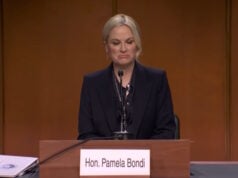
A $15,000 dispute before the Supreme Court could create billions of dollars in tax bills for rich people — or it could lead to massive government refunds to companies like Apple.
Depending on the decision, the case could also serve as the legal underpinning for an aggressive wealth tax.
At stake in the high-profile case, whose opening arguments began Tuesday, is whether certain investment profits on paper can be taxed. Under a century-old law, investors pay taxes only on gains that arise when they sell a security or other asset for a profit.
Former President Donald Trump’s individual and corporate tax cuts in 2017 created a narrow exception to that rule, through an obscure provision that says Americans who own at least 10% of a company that does business in a foreign country must pay a one-time tax on the share of profits that haven’t yet been passed on to them.
The so-called “mandatory repatriation tax” was meant to help pay for Trump’s historic cuts, which slashed the U.S. corporate rate to 21% from 35% and trimmed most individual rates, including the then-top 39.6% levy to 37%. The repatriation levy, also known as a transition tax, was also designed to capture an estimated $340 billion in U.S. tax revenues on the estimated $2 trillion in corporate earnings stashed overseas.
The Trump-era tax is a rare example of a so-called “wealth tax,” which think tanks, lobbies some Democratic lawmakers such as Sen. Elizabeth Warren of Massachusetts have been pushing for years as a solution to rising economic inequality and the swelling fortunes of an elite class of millionaires and billionaires. President Joe Biden called last year for a Billionaire Minimum Income Tax of 20% on the profits of more than 700 of the richest Americans, whether they’re realized or simply on paper.
“If the Supreme Court finds the transition tax constitutional, it would remain possible that a suitably crafted wealth tax is constitutional,” said Josiah Child, a tax lawyer at Caplin & Drysdale in New York.
Disclaimer
The information contained in South Florida Reporter is for general information purposes only.
The South Florida Reporter assumes no responsibility for errors or omissions in the contents of the Service.
In no event shall the South Florida Reporter be liable for any special, direct, indirect, consequential, or incidental damages or any damages whatsoever, whether in an action of contract, negligence or other tort, arising out of or in connection with the use of the Service or the contents of the Service. The Company reserves the right to make additions, deletions, or modifications to the contents of the Service at any time without prior notice.
The Company does not warrant that the Service is free of viruses or other harmful components












